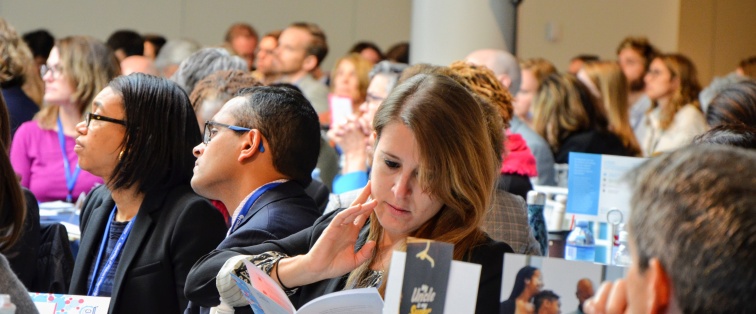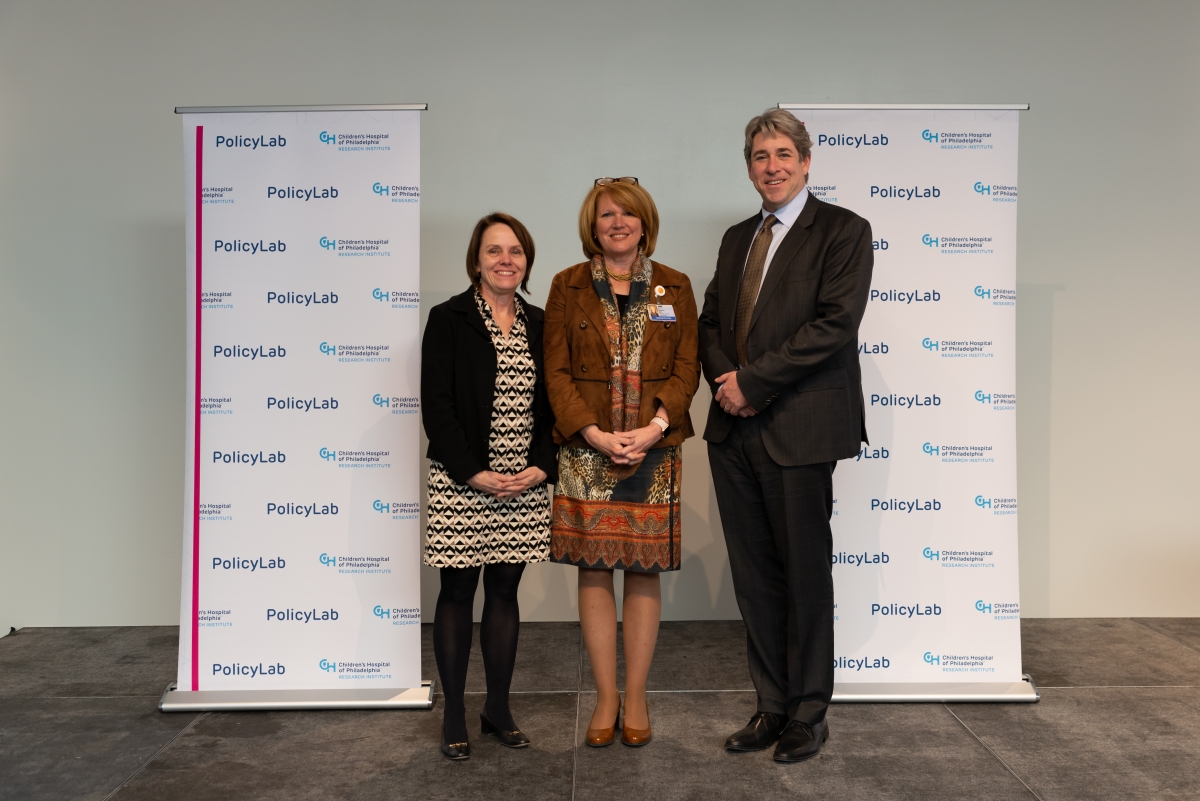10 Years Down: What's Next for PolicyLab?

This week, PolicyLab held our first forum, “Charting New Frontiers in Children’s Health Policy and Practice,” to mark our 10th anniversary as a research center at Children’s Hospital of Philadelphia (CHOP). We were joined by more than 300 friends and colleagues for discussions on emerging issues and innovations in children’s health—neither of us could have imagined such an impressive gathering when PolicyLab first started. As we close the event and prepare for what’s next, we wanted to reflect on our time together in Philadelphia and express gratitude for your partnership on the work that lies ahead.
PolicyLab’s 10th anniversary occurs against a complicated backdrop for children. On one hand, this year we have seen some important and unparalleled health policy successes for children and families at the local, state and national levels. For example, universal pre-k continued to expand in our home city of Philadelphia, legislation passed launching a kinship navigator program to support grandparents and other kin caregivers in Pennsylvania and Congress reauthorized the Children’s Health Insurance Program (CHIP) for an unprecedented 10 years.
On the other hand, we know that many issues facing children and families today are pressing, complex and in need of solutions. Child well-being is threatened by the opioid epidemic, lead and environmental exposures, inadequate school readiness, behavioral health morbidity, family separation and infant and maternal mortality—all of which are tied to persistent and pervasive socioeconomic and racial health disparities. And despite achieving a 95 percent coverage rate for our nation’s children, their access to health insurance and treatment are at risk as health care costs continue to soar. Most concerning to us is that cuts and/or changes to Medicaid—which covers nearly 40 percent of the children in this country—are inevitable and would disproportionately affect children, especially those with disabilities. As child health practitioners, researchers, advocates and policymakers, we know there is much to be done even as we acknowledge recent successes.
In spite of the threats, in many ways, there have never been more opportunities to improve the lives of children and families. Technology is opening doors for new ways to identify, communicate, coordinate and treat children and families. There is a growing acknowledgement among practitioners and policymakers that health is linked to social well-being, and that delivering services to parents in pediatric settings is possible and necessary to improve the health of children. Health systems are changing the scope and composition of clinical care teams and service delivery models. Health systems and community service providers are forging new and innovative partnerships within communities. And perhaps most importantly, policy and practice have started to reflect that the conventional notion of a doctor-patient relationship has evolved into a much more holistic approach that emphasizes the many people in and outside of health care who need to work together to improve the lives of children and strengthen communities.
 So, what’s next for PolicyLab? The national leaders we were privileged to have join us at our forum gave us our calls to action. Ms. Stephanie Barna, under secretary for defense in the Department of Defense (DoD), encouraged us to draw upon the DoD model for “family readiness,” in which they are focusing their services and resource coordination on the family unit. They recognize that the health, social and economic supports required to prepare families for success have critical impacts on the productivity and well-being of their service members, much as it would for our co-workers and communities. We also heard from Bruce Lesley and Rodney Whitlock a vision for universal children’s health insurance coverage and the work on the horizon we can get involved with to protect access to care. Madeline Bell, President and CEO of CHOP, underscored the importance of civic engagement for the protection of children’s programs. The key message strung throughout each of these leaders’ comments was that strong and timely research remains an imperative tool with singular potential to inform policies and programs for children and families.
So, what’s next for PolicyLab? The national leaders we were privileged to have join us at our forum gave us our calls to action. Ms. Stephanie Barna, under secretary for defense in the Department of Defense (DoD), encouraged us to draw upon the DoD model for “family readiness,” in which they are focusing their services and resource coordination on the family unit. They recognize that the health, social and economic supports required to prepare families for success have critical impacts on the productivity and well-being of their service members, much as it would for our co-workers and communities. We also heard from Bruce Lesley and Rodney Whitlock a vision for universal children’s health insurance coverage and the work on the horizon we can get involved with to protect access to care. Madeline Bell, President and CEO of CHOP, underscored the importance of civic engagement for the protection of children’s programs. The key message strung throughout each of these leaders’ comments was that strong and timely research remains an imperative tool with singular potential to inform policies and programs for children and families.
 While we know that we will need to use our investigators’ exceptional research to respond to imminent threats against our country’s public safety net programs, we also know that insurance coverage and access to care are a necessary but not sufficient solution for protecting the health of our youth. The most inspiring part of the forum was hearing about the ways many of you are pushing the envelope in your own health systems and communities, including instigating paradigm shifts in primary care delivery, building systems to support health care transitions for youth with complex illness, using strong data to make arguments for policies that promote health equity, responding to youth trauma and reducing juvenile incarceration rates and collaborating across public systems to improve access to behavioral health services, just to name a few accomplishments.
While we know that we will need to use our investigators’ exceptional research to respond to imminent threats against our country’s public safety net programs, we also know that insurance coverage and access to care are a necessary but not sufficient solution for protecting the health of our youth. The most inspiring part of the forum was hearing about the ways many of you are pushing the envelope in your own health systems and communities, including instigating paradigm shifts in primary care delivery, building systems to support health care transitions for youth with complex illness, using strong data to make arguments for policies that promote health equity, responding to youth trauma and reducing juvenile incarceration rates and collaborating across public systems to improve access to behavioral health services, just to name a few accomplishments.
As we look ahead, we at PolicyLab will continue to prioritize our interdisciplinary team and evidence-to-action approach, as well as continue to hold ourselves accountable to rigorous science and community partnerships. In all, the convening reminded all of us of the incredible dedication, steadfast resolve and innovation that will inevitably emerge at the local level even during a time when our national investments in children and families has been so unstable. We look forward to working with our staff, faculty and partners on our next decade of work.
*Photos courtesy of Gary Walens and Susan Lee.
This post is part of our series in recognition of PolicyLab's 10th anniversary and our ongoing efforts to chart new frontiers in children's health research and policy. Other topics have included innovation in pediatric primary care, the value of community-engaged research and PolicyLab’s origin story.
